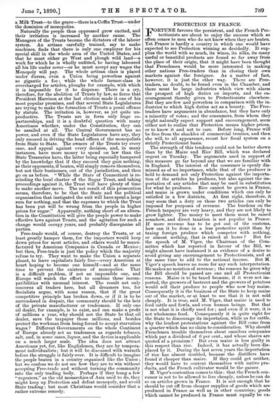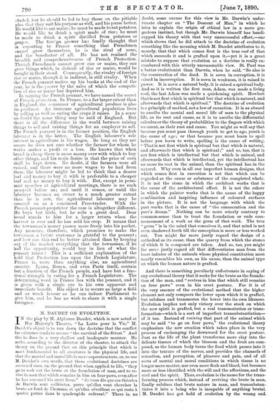PROTECTION IN FRANCE.
FORTUNE favours the persistent, and the French Pro- tectionists are about to enjoy the success which so often comes to men who do not know when they are beaten. Yet France is hardly a country in which one would have expected to see Protection whining so decidedly. It sup- plies the world with so much, its wines, its silks, its many useful or beautiful products are found so far away from the place of their origin, that it might have been thought that Frenchmen would be more interested in making other nations Free-traders than in closing their own markets against the foreigner. As a matter of fact, however, it is just the other way. There are Free- traders, no doubt, to be found even in the Chamber, and there must be large industries which view with alarm the prospect of high duties on imports, and the en- couragement thereby given to Protectionists elsewhere. But they are few and powerless in comparison with the in- dustries to which high duties act as a bounty. The Free- traders have arguments in abundance, but they have only a minority of votes ; and the consumers, from whom they might naturally expect support and encouragement, seem either not to realise that Protection means higher prices, or to know it and not to care. Before long, France will be free from the shackles of commercial treaties, and then she will, to all appearance, recast her fiscal system on a strictly Protectionist basis. The strength of this tendency could not be better shown than by the Maize and Rice Bill, which was declared urgent on Tuesday. The arguments used in support of this measure go fax beyond any that we are familiar with in England. The interest of the consumer is openly dis- missed as of no importance, while that of the producer is held to demand not only Protection against the importa- tion of the articles he produces, but also against the im- portation of any articles that may be used in substitution for what he produces. Rice cannot be grown in France, and maize is grown under conditions which can only be satisfied in a few districts, At first sight, therefore, it may seem that a duty on these two articles can only be imposed for purposes of revenue. The burdens on the French taxpayer are very heavy, and they are not likely to grow lighter. The money to meet them must be raised somehow, and direct taxation is not popular in France. If more revenue has to be got out of the customs, how can it be done in a less protective spirit than by taxing foreign produce which competes with nothing, or almost nothing, that is raised at home ? But for the speech of M. Viger, the Chairman of the Com- mittee which has reported in favour of the Bill, we might almost have instanced it as evidence of a desire to avoid giving any encouragement to Protectionists, and at the same time to add to the national income. But M. Viger's speech leaves no room for any such interpretation. He makes no mention of revenue ; the reasons he gives why the Bill should be passed are one and all Protectionist reasons. Maize is to be taxed because, if it were not im- ported, the growers of beetroot and the growers of potatoes would sell their produce to people who now buy maize. Consequently it is the business of the State to keep maize out of the market, or at least to see that it is not sold cheaply. It is true, said M. Viger, that maize is used to feed cattle and fowls, and even human beings. But that is not what it is chiefly used for ; and even if it were, it is not wholesome food. Consequently it is quite right for the State to discourage its importation, while as for cattle, why the loudest protestations against the Bill come from a quarter which has no claim to consideration. Why should Frenchmen trouble themselves about omnibus companies which pay a dividend of 6 per cent., and whose shares are quoted at a premium ? But even maize is less guilty in this respect than rice. Indeed, it has actually been dis- placed by it. During the last seven years the importation of rice has almost doubled, because the distillers have found it cheaper than maize. If they could get neither, they would have to content themselves with native pro- ducts, and the French cultivator would be the gainer.
M. Viger's contention comes to this : that the French con- sumer is not to be allowed to live cheaply, unless he can do so on articles grown in France. It is not enough that he should be cut off from cheaper supplies of goods which are produced in France as well as in other countries; goods which cannot be produced in France must equally be en- eluded, lest he should be led to buy those on the pitiable plea that they suit his purpose as well, and his purse better. He would like to eat maize; he must be made to eat potatoes. He would like to drink a spirit made of rice; he must be made to drink a spirit distilled from potatoes or grapes. The fore'gn grower ha 3 fondly thought that in exporting to France something that Frenchmen cannot grow themselves, he is the rival of none, and the benefactor of all. He has not realised the breadth and comprehensiveness of French Protection. Though Frenchmen cannot grow rice or maize, they can grow things which, in default of rice or maize, would. be bought in their stead. Consequently, the rivalry of foreign rice or maize, though it is indirect, is still rivalry. When the French peasant makes up his books at the end of the year, he is the poorer by the sales of which the competi- tion of rice or maize has deprived him. In naming the French peasant, we have named the secret of French protection. In France, to a far larger extent than in England, the consumer of agricultural produce is also its producer. An immense agricultural population lives by selling as well as eating the crops it raises. In a sense no doubt the same thing may be said of England. But there is all the difference in the world between raising things to sell and raising things for an employer to sell. The French peasant is in the former position, the English labourer is in the latter. The English labourer's sole interest in agriculture is his wages. So long as they are secure he does not care whether the farmer for whom he works makes a profit or a loss. He knows that when bread is cheap there is more money over with which to buy other things, and his main desire is that the price of corn shall be kept down. No doubt, if the farmers were all ruined, and there were no more wages to be had from them, the labourer might be led to think that a dearer loaf and money to buy it with is preferable to a cheaper loaf and no money to buy it with. But, except in pessi- mist speeches at agricultural meetings, there is no such prospect before us ; and until it comes, or until the labourer becomes an owner to a much greater extent than he is now, the agricultural labourer may be counted on as a convinced Free-trader. With the French peasant-proprietor the case is altogether different. He buys but little, but he sells a great deal. Dear bread stands to him for a larger return when the harvest is over and he has sold his crop. It means that the townsman's money passes more freely into his pocket. Any measure, therefore, which promises to make the townsman a Letter customer is grateful to the peasant; and how can this end be better attained than by keeping out of the market everything that the townsman, if he haa. the opportunity, would buy in lieu of what the peasant raises ? This is a sufficient explanation of the hold that Protection has upon the French Legislature. France is, more than anything else, an agricultural country. Lyons, Rouen, and even Paris itself, contain but a fraction of the French people, and have but a frac- tional strength in voting for a French Legislature. The determining word in France lies with the peasant, and it is given with a single eye to his own apparent and immediate benefit. His object is to secure as large a field and as much favour as he can induce Parliament to give him, and he has no wish to share it with a single foreigner.





































 Previous page
Previous page